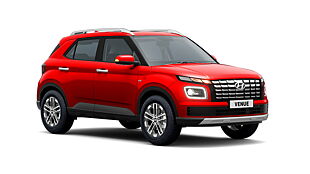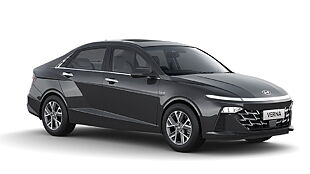Why would I buy it?
- Power delivery
- Automatic convenience
- Petrol refinement
Why would I avoid it?
- Rear headroom
- Not dynamically engaging to drive
What is it?

We still remember how the first-generation Hyundai Creta won hearts and went on to redefine the segment. Times have changed though, and buyers can now choose between Jeep’s Compass, the Tata Harrier, MG’s Hector and the Kia Seltos.
With the all-new 2020 Hyundai Creta, there’s added equipment and a fresh BS6 air about its engines like the 1.4-litre Kappa Turbo GDi petrol we have here. It certainly stands out too, with the sleek DRLs that boomerang around its cluster of headlamps. Striking indeed.

On the contrary, not only would I have loved bigger wheels for those bulging wheel arches, the latter makes the design around the C-pillar too busy for my taste. Likewise, although dazzling, I think designers went overboard at the boot section, with too many sheet metal creases and corresponding tail lamp arrangements.
How is it on the inside?

Finding a comfy driving position inside the new Creta is a breeze. There’s good visibility thanks to the tall seats and a reasonably large glass-area with slender door mirrors. As a matter of fact, the wide seven-inch touchscreen infotainment system, together with the ambient lighting and fresh design lines with snazzy orange highlights sprinkled all across makes for quite the visual treat.

Again, the superior resolution of the touchscreen infotainment system’s panel makes for vibrant colours, and the snappy touch sensitivity helps in swift toggling between screens. In fact, listening to your favourite tracks on the Bose unit is simply astounding.

Then there’s the contemporary part-digital, part-analog instrument cluster with colourful and attractive graphics whose sporty personality blends instantly with the flat-bottomed compact steering wheel. But the buttons lack the tactile feel, and the short volume-rockers aren’t great for someone with fat fingers. Similarly, the matte grey panel below the air-con controls felt tacky.

That aside, the Creta’s leatherette seats with firm cushioning is bound to make long journeys comfortable. The front cooled seats in particular, are accommodating, with lots of thigh and lateral support. Even tall people will appreciate the shoulder-and-head room. But this isn’t the case with the rear bench as tall occupants may brush their heads, and seating three abreast will still be a squeeze.

But having said that, the bench’s adequate contours coupled with an adjustable two-angle backrest makes for a comfortable seating posture. An experience that’s only further amplified by the generous legroom (I’m 5 feet 8 inches tall). We only wish it had a wee-bit more thigh support.

As for practicality, the 60:40 bench can liberate more boot space which can otherwise swallow two medium-sized suitcases and some soft bags. And, as the loading lip isn’t too far off the ground, lifting baggage on to the boot enclosure isn’t challenging. For more on this SX(O) variant’s features, read this story.
How does it drive?

The Creta we have here is 138bhp/242Nm 1.4-litre Kappa Turbo GDi petrol which sends power to the front wheels via a seven-speed dual-clutch transmission (DCT) with paddle shifters. Straight off, the yacht-inspired gear-stick took to my palm like a glove, and combined with the ergonomically-placed release button, makes for some intuitive shifting.
Mind you, this petrol is a refined one, and combined with favourable insulation job, makes for a NVH-free cabin. Moreover, it's a relaxed motor which has a linear power delivery from the word go. It serves you a persistent surge of power from 1500rpm to the 6000rpm redline. Which not only makes for swift dashes in the city, but also effortless mile munching. In fact, this DCT gearbox shifts in a smooth and unobtrusive manner.

And, unlike recent cars I’ve driven, the drive-modes here are quite fulfilling. The interesting bit is the precise manner in which the system senses your throttle input. In Comfort and Eco mode, with a light foot, the gearbox upshifts at around 2000rpm. If it senses more throttle, it will upshift later as you steady the accelerator pedal. Of course, it goes without saying that the engine responses in ‘Eco’ is sedate and more relaxed than ‘Comfort’.
Furthermore, in kick-down situations, if the throttle increase is minor, Eco and Comfort modes first try to deal with it by using the same gear. But for major increments, the DCT resorts to downshifting. What’s remarkable is that, given the situation where the throttle is pinned, in either Eco or Comfort modes, the system drops multiple gears to serve you more power, and even holds the gear when necessary.

So, what’s Sport mode for, then? Well, call it the ‘steroids’ mode if you may, as responses improve drastically, but aren’t jerky so to say. The ‘box holds a lower gear to keep the revs on boil, and more often than not, this is the only time you can constantly hear the engine. Equally important, those who prefer to manually shift can experience all modes via the lever or the paddle shifters.
Now, the new Creta’s ride quality at slow speeds, although absorbent, has a firm edge to it. So, while the smaller irregularities are treaded over without any movement, the harsh bumps can be felt within the cabin; including an occasional thud over the severe ones. As the Creta picks up pace though, bump absorption improves tremendously, thereby offering a pliant ride. However at higher speeds, low-frequency bounces can be felt over harsher irregularities.

Nonetheless, what elevates the comfort-quotient is the scant suspension noise, or for that matter, minimal external noises. As for the steering, it is light, accurate and the feedback is progressive. However, it feels vague around the centre, and with three turns from lock-to-lock, isn’t exactly quick either. This essentially means there’s more arm-work involved while manoeuvring through tight city lanes or constricted parking spots.

That aside, despite there being some roll around twisty roads, it is masked favourably by the ideal chassis balance to offer good confidence. Also, the traction control modes; ‘Snow’, ‘Sand’ and ‘Mud’ claim to offer varied responses for better traction on these terrains, but we will reserve our judgement for the road-test review. As for the brakes, we’d have loved more initial bite, but nevertheless, they bring this SUV to an assuring stop, with some nose dive under spirited braking.
Should I buy one?

Prices for the 2020 Hyundai Creta turbo petrol DCT ranges from Rs 19.12 to Rs 20.33 lakh (on-road Mumbai). Its bang on target if you take into account the prices of its segment rivals; barring the expensive Jeep Compass, of course.
What goes against the new 2020 Hyundai Creta is that it could have been more dynamically engaging to drive, and the headroom at the rear could have been more accommodating. But, all said and done, this SUV boasts of good performance, drivability and refinement, along with a spacious and feature-loaded cabin. And lest I forget, the perks of being a part of Hyundai’s solid network is hard to resist too.
Where does it fit in?

The Hyundai Creta petrol DCT ranges from Rs 19.12 to Rs 20.33 lakh (on-road Mumbai). It slots in the segment currently occupied by the likes of the Kia Seltos and MG Hector (give or take around Rs 30,000). Furthermore, the Mahindra XUV500 may only cost a few thousands more, but the Jeep Compass starts much higher at Rs 23.19 lakh, and goes all the way to Rs 26.02 lakh.
Pictures by Santosh Nair and Kapil Angane

![Hyundai Creta [2020-2023] Exterior Hyundai Creta [2020-2023] Exterior](https://imgd.aeplcdn.com/642x361/n/cw/ec/46757/hyundai-creta-exterior22.jpeg?wm=1&q=80)
![Hyundai Creta [2020-2023] Exterior Rear View Hyundai Creta [2020-2023] Exterior Rear View](https://imgd.aeplcdn.com/642x361/n/cw/ec/46757/hyundai-creta-exterior-rear-view20.jpeg?wm=1&q=80)
![Hyundai Creta [2020-2023] Exterior Rear View Hyundai Creta [2020-2023] Exterior Rear View](https://imgd.aeplcdn.com/642x361/n/cw/ec/46757/hyundai-creta-exterior-rear-view5.jpeg?wm=1&q=80)
![Hyundai Creta [2020-2023] Exterior Left Rear Three Quarter Hyundai Creta [2020-2023] Exterior Left Rear Three Quarter](https://imgd.aeplcdn.com/642x361/n/cw/ec/46757/hyundai-creta-exterior-left-rear-three-quarter1.jpeg?wm=1&q=80)
![Hyundai Creta [2020-2023] Exterior Left Rear Three Quarter Hyundai Creta [2020-2023] Exterior Left Rear Three Quarter](https://imgd.aeplcdn.com/642x361/n/cw/ec/46757/hyundai-creta-exterior-left-rear-three-quarter2.jpeg?wm=1&q=80)
![Hyundai Creta [2020-2023] Exterior Left Front Three Quarter Hyundai Creta [2020-2023] Exterior Left Front Three Quarter](https://imgd.aeplcdn.com/642x361/n/cw/ec/46757/hyundai-creta-exterior-left-front-three-quarter0.jpeg?wm=1&q=80)
![Hyundai Creta [2020-2023] Exterior Front View Hyundai Creta [2020-2023] Exterior Front View](https://imgd.aeplcdn.com/642x361/n/cw/ec/46757/hyundai-creta-exterior-front-view3.jpeg?wm=1&q=80)
![Hyundai Creta [2020-2023] Exterior Front View Hyundai Creta [2020-2023] Exterior Front View](https://imgd.aeplcdn.com/642x361/n/cw/ec/46757/hyundai-creta-exterior-front-view4.jpeg?wm=1&q=80)
![Hyundai Creta [2020-2023] Image Hyundai Creta [2020-2023] Image](https://imgd.aeplcdn.com/272x153/n/cw/ec/41564/hyundai-creta-right-front-three-quarter9.jpeg?q=80)























